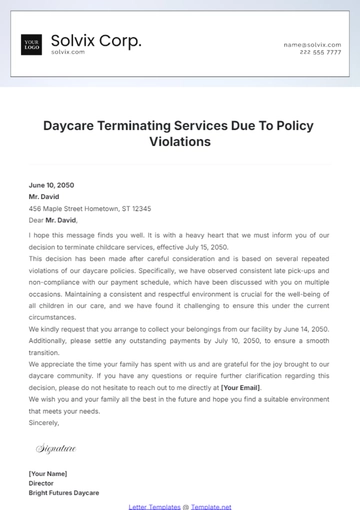Free Massage Cancellation Policy

I. Introduction
A. Purpose
The key purposes of the policy are the following:
Ensuring Clear Guidelines: Establishing clear guidelines for cancellations helps prevent misunderstandings between clients and staff. It ensures that everyone knows the expectations and consequences of canceling or rescheduling appointments.
Promoting Fairness and Consistency: A consistent approach to handling cancellations promotes fairness among clients. It ensures that all clients are treated equally and that the policy is applied uniformly by all staff members.
Optimizing Appointment Schedules: By defining structured cancellation policies, we can better manage our therapists' schedules. This optimization helps us
B. Scope
This policy applies to all clients who schedule massage appointments at [Your Company Name]. It covers the procedures and fees associated with cancellations and rescheduling, providing clear instructions for clients to follow. The policy also provides guidelines for staff on how to handle cancellations and rescheduling requests. This ensures that all team members apply the policy consistently, maintaining fairness and transparency.
C. Importance
The importance of having a cancellation policy:
Managing Schedules Effectively: A clear cancellation policy allows for better management of appointment schedules. It reduces the number of no-shows and last-minute cancellations, ensuring that therapists' time is used efficiently.
Encouraging Respect for Resources: The policy encourages clients to respect the time and resources of our therapists. By understanding the implications of late cancellations, clients are more likely to adhere to the notice periods and fees outlined.
Enhancing Client Satisfaction: A transparent and fair cancellation policy enhances client satisfaction. Clients who understand the policy are more likely to feel respected and valued, contributing to a positive overall experience.
D. Policy Goals
The following are the goals of the cancellation policy:
Minimizing Schedule Disruptions: The policy aims to minimize disruptions to the appointment schedule. By clearly defining notice periods and fees, we can ensure that cancellations are managed in an orderly manner.
Managing Resources Efficiently: By setting clear guidelines, we can manage our resources more efficiently. This includes optimizing the use of therapists' time and ensuring that appointment slots are utilized effectively.
Enhancing Client Communication: One of the goals is to improve communication with clients regarding cancellations. Clear guidelines help clients understand what is expected of them, leading to fewer misunderstandings and better overall service.
II. Cancellation Notice Period
The cancellation notice period is the time frame within which clients must cancel their appointments to avoid incurring fees. This period is essential for managing schedules effectively and ensuring that therapists' time is utilized efficiently. The following table outlines the cancellation notice periods for different types of appointments:
Appointment Type | Notice Period | Fee |
|---|---|---|
Standard Massage | 24 hours | 25% of the appointment fee |
Extended Session | 48 hours | 50% of the appointment fee |
Group Booking | 72 hours | 75% of the total booking fee |
A. Standard Massage
Clients must provide at least 24 hours' notice to cancel a standard massage appointment. This allows sufficient time for the appointment slot to be offered to another client. A cancellation fee of 25% of the appointment fee will be charged for late cancellations. This policy ensures fairness and encourages clients to respect the scheduling guidelines.
B. Extended Session
For extended sessions, clients must provide at least 48 hours' notice to cancel the appointment. Extended sessions require more time and resources, so a longer notice period is necessary. A cancellation fee of 50% of the appointment fee will be charged for late cancellations. This policy helps manage therapist availability and reduce the impact of late cancellations.
C. Group Booking
Group bookings require at least 72 hours' notice to cancel. These bookings often involve multiple clients and more complex scheduling arrangements. A cancellation fee of 75% of the total booking fee will be charged for late cancellations. This policy ensures that group bookings are managed effectively and resources are utilized efficiently.
Setting clear cancellation notice periods helps manage appointment schedules and reduces the likelihood of no-shows. By adhering to these guidelines, we can provide a more efficient and fair service to all clients.
III. Rescheduling Policy
The rescheduling policy provides guidelines for clients who need to change their appointment times. This policy aims to accommodate clients' needs while ensuring that therapists' schedules are managed effectively. The following table outlines the rescheduling notice periods for different types of appointments:
Appointment Type | Notice Period | Fee |
|---|---|---|
Standard Massage | 24 hours | No fee |
Extended Session | 48 hours | No fee |
Group Booking | 72 hours | No fee |
A. Standard Massage
Clients can reschedule a standard massage appointment with at least 24 hours' notice without incurring any fees. This allows sufficient time for the appointment slot to be offered to another client and ensures that the therapist's schedule is managed effectively. By providing timely notice, clients help maintain a smooth and efficient booking system.
B. Extended Session
For extended sessions, clients must provide at least 48 hours' notice to reschedule the appointment without incurring any fees. Extended sessions require more time and resources, so a longer notice period is necessary to manage the schedule effectively. This policy helps ensure that therapists' time is utilized efficiently and reduces the impact of rescheduling.
C. Group Booking
Group bookings require at least 72 hours' notice to reschedule without incurring any fees. Group bookings often involve multiple clients and more complex scheduling arrangements, so the longer notice period helps manage these appointments more effectively. This policy ensures that group bookings are handled smoothly and that resources are utilized efficiently.
The rescheduling policy provides flexibility for clients while ensuring that therapists' schedules are managed effectively. By adhering to the required notice periods, clients can reschedule their appointments without incurring any fees, promoting a fair and efficient booking system.
IV. Special Circumstances
Special circumstances may require exceptions to the standard cancellation and rescheduling policies. The following table outlines the special circumstances and the associated policies:
Special Circumstance | Policy | Description |
|---|---|---|
Medical Emergencies | No fee for late cancellations | Clients can cancel without fees for medical emergencies. |
Family Emergencies | No fee for late cancellations | Clients can cancel without fees for family emergencies. |
Unforeseen Events | Management discretion for fee waivers | Management may waive fees for unforeseen events. |
A. Medical Emergencies
Clients who need to cancel their appointment due to a medical emergency can do so without incurring any fees. Medical emergencies are unpredictable and can disrupt planned appointments. By waiving cancellation fees in such cases, we ensure that clients are not unfairly penalized for circumstances beyond their control. This policy promotes fairness and compassion in our service.
B. Family Emergencies
Family emergencies can also disrupt clients' ability to keep their appointments. Clients can cancel their appointments due to family emergencies without incurring any fees. This policy provides flexibility and support for clients during difficult times, recognizing the impact of family emergencies on their ability to attend appointments.
C. Unforeseen Events
Unforeseen events, such as natural disasters or other unexpected occurrences, may prevent clients from attending their appointments. Management has the discretion to waive cancellation fees for unforeseen events. This policy allows for flexibility and compassionate handling of exceptional circumstances, ensuring clients are not unfairly penalized for events beyond their control.
Special circumstances policies ensure that clients facing exceptional situations are treated fairly and compassionately. By providing clear guidelines for fee waivers, we can accommodate clients' needs while maintaining the integrity of the cancellation policy.
V. Communication of Policy
Effective communication of the cancellation policy is essential to ensure clients are aware of the terms and conditions. The following table outlines the methods used to communicate the policy to clients and staff:
Communication Method | Description | Frequency |
|---|---|---|
Website | Policy details available online | Continuous |
Appointment Confirmations | Policy included in confirmation emails | Upon booking |
In-Spa Signage | Policy displayed in the spa | Continuous |
A. Website
The cancellation policy details are available on our website for clients to review at any time. Providing the policy online ensures that clients have easy access to the information they need when booking and managing their appointments. This method allows clients to familiarize themselves with the policy at their convenience.
B. Appointment Confirmations
The cancellation policy is included in appointment confirmation emails sent to clients upon booking. Including the policy in these emails ensures that clients are reminded of the terms and conditions each time they schedule an appointment. This method helps reinforce the policy and reduce the likelihood of misunderstandings.
C. In-Spa Signage
The cancellation policy is displayed prominently within the spa. In-spa signage ensures that clients are aware of the policy when they visit for their appointments. This method provides a visual reminder of the policy and encourages compliance.
Effective communication of the cancellation policy helps ensure that clients understand and adhere to the terms and conditions. By using multiple methods to communicate the policy, we can reach clients through various channels and promote awareness.
VI. Handling Disputes
Handling disputes effectively is crucial to maintaining client satisfaction and operational efficiency. The following table outlines the procedures for addressing disputes related to the cancellation policy:
Dispute Type | Procedure | Resolution Time |
|---|---|---|
Fee Disputes | Review by management | Within 7 business days |
Policy Clarification | Explanation provided to client | Within 3 business days |
Exceptional Circumstances | Consideration by management | Within 7 business days |
A. Fee Disputes
Clients who dispute a cancellation fee can request a review by management. Management will review the circumstances of the cancellation and determine if the fee was applied correctly. This process ensures that clients' concerns are addressed fairly and transparently. The resolution time for fee disputes is typically within 7 business days.
B. Policy Clarification
Clients seeking clarification about the cancellation policy can contact our customer service team. Our team will provide a detailed explanation of the policy terms and conditions. This process helps ensure that clients fully understand the policy and reduces the likelihood of future disputes. The resolution time for policy clarifications is typically within 3 business days.
C. Exceptional Circumstances
Clients who believe their situation warrants an exception to the standard policy can request consideration by management. Management will evaluate the circumstances and decide whether to waive the cancellation fee. This process allows for flexibility in handling unique situations and promotes fairness. The resolution time for exceptional circumstances is typically within 7 business days.
Effective handling of disputes ensures that clients feel heard and respected. By providing clear procedures for addressing disputes, we can maintain client satisfaction and promote transparency in our operations.
VII. Review and Updates
Regular review and updates of the cancellation policy are essential to ensure its continued relevance and effectiveness. The following table outlines the review schedule and the process for making updates to the policy:
Review Type | Frequency | Responsible Party |
|---|---|---|
Annual Review | Once per year | Spa Manager |
Client Feedback | Ongoing | Customer Service Team |
Staff Feedback | Quarterly | Spa Manager |
A. Annual Review
The cancellation policy is reviewed annually to ensure its effectiveness and relevance.
Conducting the Review: The Spa Manager conducts a comprehensive review of the cancellation policy annually. This involves evaluating the policy’s current effectiveness and identifying any areas that need improvement.
Gathering Data: During the review, relevant data such as client feedback, staff input, and cancellation statistics are gathered. This data helps in making informed decisions about potential updates to the policy.
Implementing Changes: Based on the review and gathered data, necessary updates to the policy are made. These changes are then communicated to all staff and clients to ensure everyone is aware of the new guidelines.
B. Client Feedback
Client feedback is collected on an ongoing basis to identify areas for improvement in the cancellation policy.
Collecting Feedback: The Customer Service Team collects feedback from clients continuously. This can be done through surveys, comment cards, or direct communication with clients.
Analyzing Feedback: Once feedback is collected, it is analyzed to identify common themes and areas of concern. This analysis helps in understanding clients' perspectives and pinpointing specific issues with the current policy.
Incorporating Feedback: Relevant feedback is used to make improvements to the cancellation policy. By incorporating clients' suggestions and addressing their concerns, we can enhance the effectiveness and fairness of the policy.
C. Staff Feedback
Staff feedback is collected quarterly to identify any issues or areas for improvement in the application of the cancellation policy.
Soliciting Feedback: The Spa Manager solicits feedback from staff on a quarterly basis. This feedback is gathered through meetings, surveys, or suggestion boxes to ensure that all staff members can contribute their insights.
Evaluating Feedback: The collected feedback is evaluated to identify any issues or inconsistencies in the application of the policy. This helps in understanding how the policy is working in practice and any challenges staff may face.
Implementing Improvements: Based on the feedback, necessary improvements are made to the policy or its implementation. These changes are communicated to all staff to ensure a consistent and effective application of the policy.
Regular review and updates of the cancellation policy ensure that it remains relevant and effective. By considering feedback from clients and staff, we can make informed decisions about necessary changes and improvements, promoting a fair and efficient booking system.
- 100% Customizable, free editor
- Access 1 Million+ Templates, photo’s & graphics
- Download or share as a template
- Click and replace photos, graphics, text, backgrounds
- Resize, crop, AI write & more
- Access advanced editor
Guarantee smooth appointment cancellations with our Massage Cancellation Policy Template from Template.net! This customizable and editable resource offers a structured framework for communicating cancellation terms to massage therapy clients. Tailor the policy to reflect your spa's booking protocols, and utilize the integrated AI Editor Tool for clear and tailored content!
You may also like
- HR Policy
- Restaurant Policy
- Company Policy
- Accounting Policies and Procedures
- Website Policy
- Privacy Policy
- Safety Policy
- School Policy
- IT and Software Policy
- Law Firm Policy
- Construction Policy
- Interior Design Policy
- Travel Agency Policy
- Education Academic Policy
- Security Policy
- Real Estate Policy
- Expense Policy
- Software Policy





























